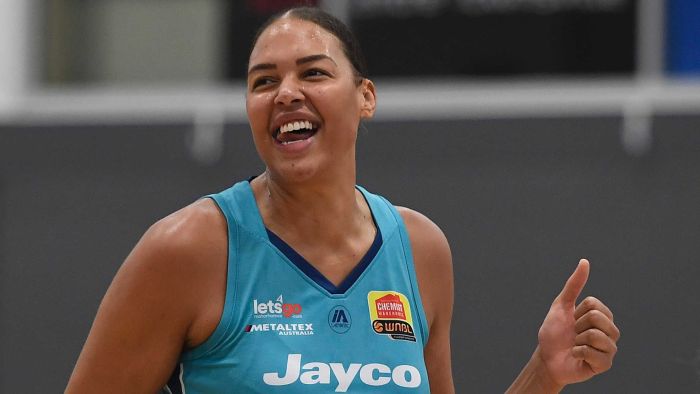Two retired basketballers who are now administrators — yet most importantly parents of daughters — have led the implementation of the WNBL’s first collective bargaining agreement (CBA) in the competition’s 41st season.
Key points:
- Retired Opals Laura Hodges and Lauren Jackson signed off on the CBA this week
- The CBA features standardised minimum wage rises for rostered and development players over the next three years
- Hodges described the deal as a watershed moment for the WNBL
Former NBL and Australian Boomers player Jacob Holmes, who is Australian Basketball Players’ Association (ABPA) chief executive, and four-time Olympian and ABPA board member Laura Hodges developed the framework.
The agreement establishes minimum professional standards for all WNBL athletes, elevating the sport to compete with playing conditions for athletes from rival national codes.
It was this week signed off on by Hodges and Australia’s greatest ever player, Lauren Jackson, who is now head of women in basketball at Basketball Australia.
Loading…
“The fact Jacob and I are both parents to daughters was a big thing, forefront of our minds and something we would talk about,” Hodges told ABC Sport.
“Jacob’s got three daughters and I now have two, and we always said this CBA was for the future, our daughters and our next generation of Australian female basketballers.”
The CBA features standardised minimum wage rises for rostered and development players over the next three years, and improved health care standards, including private health insurance and physiotherapy when travelling interstate for games.
There will be a greater emphasis on culture and community player education, and engagement and other basic conditions such as advanced scheduling and improved travel conditions, in addition to apparel and professional services.
Hodges, who retired from the WNBL and the Adelaide Lightning earlier this year, said it was a watershed moment for the world-class league.
“Having recently retired, I’ve certainly felt mixed emotions,” she said.
“In 2016, Jacob Holmes started the ABPA and he always wanted to bring the WNBL and the NBL, and the Australian Opals and Boomers together.
“One of the first things he spoke to me about was the fact as women we didn’t have a CBA and that was his goal, then it became my goal and then literally every player in the league’s goal over the last few years.
Loading
“Everyone’s understood why it’s so important and I’m so proud of all the players, and especially the delegates, how they’ve stayed motivated for this and it’s been great how the WNBL, Basketball Australia and ABPA have come together and got a resolution.
“I think this is just the start. We have to keep setting goals and pushing to be the most professional and elite women’s code in Australia and that’s a really important goal to have.
“Basketball is an international game with the Olympics as our pinnacle and we have to keep striving to be better and this is the best stepping stone for it.”
CBA to help future generations
While establishing better conditions for the current crop of players who are contesting the 2020 WNBL season in hub-like conditions in North and Far North Queensland, there has been a constant eye to the future and generation next.
Hodges said the players she grew up idolising were trailblazers and it was the responsibility of every generation to create a better tomorrow for the next wave of elite women’s players.
“There’s so many players, women, who paved the way for us,” she said.
“The Michele Timmses and Sandy Brondellos, who were the first to go overseas and play in the WNBA and Europe, and make a name for us and women’s basketball in Australia.
“They gave us the opportunity to take contracts overseas and it’s now up to us to pave the way for our next generation of elite Australian women’s basketballers.”
It is a sentiment strongly echoed by Southside Flyers and Australian Opals captain Jenna O’Hea, who welcomed the announcement this week.
“I’m so proud of the CBA being put in place. It’s taken a long time but it’s a start and all about moving our great game forward,” she said.
“It’s about providing our current players a platform in which they are looked after and for me specifically, it’s about leaving the game in a better position than when I came into it, providing opportunities for our up-and-coming talent to thrive and be the best possible players and people they can be.
Female pathways essential




Holmes said times had changed since he and Hodges attended the Australian Institute of Sport in Canberra on scholarships two decades ago.
“When I was growing up, I could play any sport and aspire to play professionally because I was a boy and it’s really dawned on me, having three daughters and seeing them starting to play basketball and other sports, that they should absolutely have that same pathway available to them and opportunity,” he said.
“It should be part of their dreams and hopes and not, ‘Oh I really hope I can play professional sport but I’ll have to probably work full-time, do it around that, scrounge around and sacrifice family’.
“I realise now athletes would have been consciously aware of that as female basketballers coming through.
“For basketball, this is us putting a step forward for future players and young girls, like my daughters, who can look at it and say ‘I can play professional basketball in Australia and be on TV, I can play for my country, for my city, for my state and I can do that without having to be semi-professional and working on the side’.
“That’s what’s really brought it home for me on a personal level.”
Round two of the WNBL season continues on Saturday when the Townsville Fire face the Bendigo Spirit on ABC TV at 5:00pm AEDT.
Megan Hustwaite has covered the WNBL for the past 12 seasons and is a member of the ABC commentary team.







